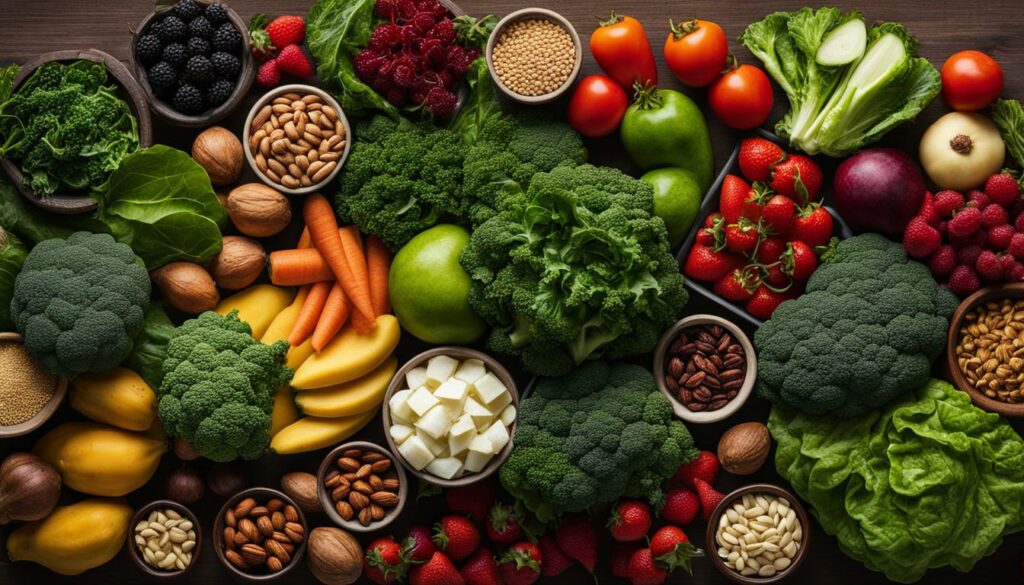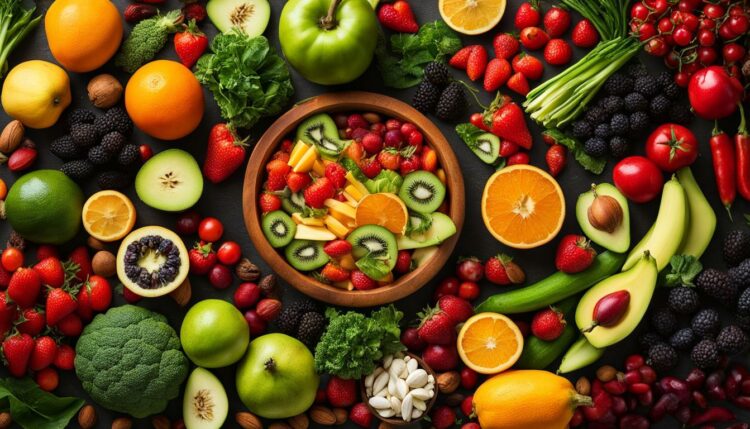When it comes to maintaining optimal nutrition, choosing foods with high nutrient content is key. These nutrient-dense foods are packed with powerful nutrients that can boost your overall health and well-being.
Incorporating superfoods into your diet can help ensure that you are getting the most out of every meal and maximizing your nutritional intake.
It is important to note that no single food can provide all the nutrients your body needs. Therefore, it is essential to have a varied diet that includes a wide range of nutrient-dense options.
By choosing foods with the highest amount and greatest variety of nutrients, you can support your body’s optimal functioning and promote a healthy lifestyle.
One excellent example of a nutrient-dense food is salmon. Rich in omega-3 fatty acids, protein, vitamins, and minerals, salmon offers a wide array of health benefits. Likewise, sardines are another fantastic option.
These small fish are loaded with almost every nutrient your body requires, making them an excellent addition to your diet.
Kale, a nutrient-dense vegetable, is rich in vitamins, minerals, and cancer-fighting compounds. Seaweed, which is highly nutritious, provides an excellent source of iodine. Garlic, known for its distinct taste, is not only flavorful but also packed with vitamins, minerals, and disease-fighting compounds.
Shellfish, such as clams and oysters, are some of the most nutritious animals found in the sea. Potatoes, a staple in many diets, are a good source of potassium, magnesium, iron, and other essential nutrients.
Liver, a highly nutritious organ meat, contains large amounts of B vitamins. Berries, especially blueberries, are rich in antioxidants and offer various health benefits. Eggs, a versatile and highly nutritious food, provide protein, healthy fats, and essential nutrients.
Bitter melon, a vegetable with antioxidant properties, may also have numerous health benefits. Lastly, cocoa and dark chocolate, high in minerals and antioxidants, can provide positive health effects when consumed in moderation.
Key Takeaways:
- Choosing nutrient-dense foods is crucial for optimizing your nutrition and overall well-being.
- Include a variety of nutrient-dense foods in your diet to ensure you get a wide range of essential nutrients.
- Avoid highly processed foods that are low in nutritional value.
- Incorporate foods like salmon, sardines, kale, seaweed, garlic, and other nutrient-dense options into your meal planning for optimal nutrition.
- Remember that nutrient-dense foods are not only packed with vitamins and minerals but also contain disease-fighting compounds and antioxidants.
The Importance of Nutrient-Dense Foods for Optimal Nutrition
Nutrient-dense foods play a crucial role in achieving optimal nutrition and maintaining overall health. These foods are packed with essential vitamins, minerals, antioxidants, and bioactive substances that support your body’s needs and promote well-being.
When it comes to choosing the right foods, prioritizing nutrient-dense options allows you to maximize your intake of these valuable nutrients while making the most of your calorie budget.
Unlike highly processed foods that are often high in calories but offer little nutritional value, nutrient-dense foods are typically whole or minimally processed. They are devoid of added sugars, sodium, and refined grains, allowing you to reap the benefits of their high nutrient content.
By incorporating nutrient-dense foods into your diet, you can enhance your nutritional intake significantly. These foods provide an abundance of vitamins, minerals, and antioxidants, which are essential for maintaining optimal health.
They also offer various bioactive substances that possess unique properties and contribute to overall well-being.
Consuming a variety of nutrient-dense foods is key to ensuring that you obtain a wide range of essential nutrients. A diverse selection of fruits, vegetables, whole grains, lean proteins, and healthy fats will provide your body with the nourishment it needs to thrive.

| Food Group | Examples |
|---|---|
| Fruits | Blueberries, oranges, strawberries |
| Vegetables | Kale, spinach, broccoli |
| Proteins | Salmon, chicken breast, tofu |
| Whole Grains | Quinoa, brown rice, oats |
| Healthy Fats | Avocado, olive oil, nuts |
Including nutrient-dense foods as a foundational part of your diet is essential for optimal nutrition. By making these choices, you can support your overall health, maximize your intake of valuable nutrients, and enjoy the numerous benefits that nutrient-dense foods have to offer.
Salmon and Sardines: Nutrient-Rich Fish
Salmon and sardines are two types of fish that are packed with essential nutrients, making them excellent choices for a healthy diet. These fish are not only delicious but also offer numerous health benefits due to their high nutrient content. Let’s explore why salmon and sardines should be a part of your heart-healthy eating plan.
The Power of Omega-3 Fatty Acids
One of the standout nutritional qualities of salmon and sardines is their rich content of omega-3 fatty acids. These essential fats play a crucial role in brain function, heart health, and overall well-being.
Omega-3 fatty acids have been associated with reducing inflammation, lowering blood pressure, and decreasing the risk of chronic diseases. Including salmon and sardines in your diet can help ensure you’re getting an adequate intake of these heart-healthy fats.
Protein, Vitamins, and Minerals
In addition to omega-3 fatty acids, salmon and sardines are also excellent sources of high-quality protein, vitamins, and minerals. These fish provide a wide range of nutrients that are essential for overall health.
Salmon, for example, is rich in vitamin D, vitamin B12, selenium, and potassium, which are all important for various bodily functions. Sardines, on the other hand, are loaded with almost every nutrient your body needs, including calcium, iron, and magnesium.
Heart Health Benefits
Regular consumption of salmon and sardines has been linked to a lower risk of heart disease, dementia, and other common ailments. The omega-3 fatty acids found in these fish have been shown to reduce triglyceride levels, decrease blood clotting, and lower the risk of abnormal heart rhythms.
Including salmon and sardines as part of a heart-healthy eating plan can have a significant positive impact on cardiovascular health.
Easy Ways to Incorporate Salmon and Sardines into Your Diet
Now that we know the incredible health benefits of salmon and sardines, here are a few simple ways to add them to your diet:
- Grill or bake salmon and serve it with roasted vegetables for a nutritious and delicious meal.
- Add canned sardines to salads, sandwiches, or pasta dishes for a quick and convenient source of nutrients.
- Make a flavorful salmon or sardine patty and enjoy it as a healthy burger alternative.
- Prepare a refreshing salad with mixed greens, cherry tomatoes, avocado, and grilled salmon or sardines.
By incorporating these nutrient-rich fish into your regular meal rotation, you can take advantage of their high nutrient content and enjoy the many health benefits they offer.
Kale, Seaweed, and Garlic: Nutrient-Dense Plant Foods
Kale, seaweed, and garlic are highly nutritious plant foods that offer a wide range of vitamins, minerals, and disease-fighting compounds. Including these nutrient-dense vegetables in your diet can help increase your intake of essential nutrients and promote optimal health.
Kale is a nutrient-dense vegetable that is rich in vitamins C, A, K, and B6, as well as potassium, calcium, magnesium, copper, and manganese. It is known for its vibrant green color and unique taste. Kale is loaded with antioxidants and is a great source of fiber, which supports digestive health.
Additionally, it contains cancer-fighting compounds that may help protect against certain types of cancer.
| Vitamins | Minerals | Other Compounds |
|---|---|---|
| Vitamin C | Potassium | Antioxidants |
| Vitamin A | Calcium | Cancer-fighting compounds |
| Vitamin K | Magnesium | Fiber |
| Vitamin B6 | Copper | |
| Manganese |
Seaweed is another nutrient-dense plant food that deserves attention. It is highly nutritious and a good source of minerals such as calcium, iron, magnesium, manganese, and iodine.
Seaweed is often used in Asian cuisine and is gaining popularity worldwide due to its health benefits. It is packed with antioxidants and bioactive compounds that may help protect against inflammation and other health issues.

Garlic is not only a flavorful ingredient in various dishes, but it is also a highly nutritious food. It provides vitamins C, B6, and B1, as well as minerals like calcium, potassium, copper, manganese, and selenium.
Garlic is well-known for its immune-boosting properties and its ability to lower blood pressure and improve heart health. It also contains disease-fighting compounds that may help reduce the risk of certain cancers.
By incorporating nutrient-dense vegetables like kale, seaweed, and garlic into your diet, you can enhance your overall nutrient intake and support optimal health. These plant foods are not only packed with vitamins and minerals but also offer disease-fighting compounds that contribute to a well-rounded and nutritious diet.
Conclusion
Consuming nutrient-dense foods is crucial for optimal nutrition and overall health. Incorporating these foods into your meal planning and nutrition strategies can provide you with the healthiest food options.
Salmon, sardines, kale, seaweed, garlic, and other nutrient-dense foods offer a high nutrient content and are considered superfoods. They are packed with a wide range of vitamins, minerals, and disease-fighting compounds, making them an excellent choice for promoting optimal nutrition.
By including nutrient-dense foods in your diet, you can maximize your intake of powerful nutrients and support your overall well-being. These foods provide the necessary building blocks for optimal health and ensure that your body receives the nutrients it needs to function at its best.
Make nutrient-dense foods an essential part of your daily eating habits. Prioritize these superfoods for optimal nutrition and enjoy the numerous benefits they bring to your health.
FAQ
What are nutrient-dense foods?
Nutrient-dense foods are foods that contain a high amount and a great variety of essential vitamins, minerals, antioxidants, and bioactive substances. These foods provide optimal nutrition and are packed with powerful nutrients that support overall health and well-being.
Why are nutrient-dense foods important for optimal nutrition?
Nutrient-dense foods are essential for maximizing your intake of essential vitamins, minerals, and superfoods. By choosing these foods, you can make the most of your calorie budget and ensure you are getting the highest amount and greatest variety of nutrients for optimal health benefits.
What are some examples of nutrient-dense foods?
Examples of nutrient-dense foods include salmon, sardines, kale, seaweed, garlic, berries, eggs, bitter melon, cocoa, dark chocolate, liver, and shellfish. These foods offer a wide range of essential nutrients, including vitamins, minerals, and disease-fighting compounds.
Why are salmon and sardines considered nutrient-rich fish?
Salmon and sardines are considered nutrient-rich fish because they are high in omega-3 fatty acids, which are essential for brain function, heart health, and other bodily processes.
They also provide high-quality animal protein, vitamins, and minerals, and are associated with a lower risk of heart disease, dementia, and other common diseases.
What nutrients are found in kale, seaweed, and garlic?
Kale is a nutrient-dense vegetable that contains large amounts of vitamins C, A, K, and B6, as well as potassium, calcium, magnesium, copper, and manganese.
Seaweed is highly nutritious and a good source of minerals such as calcium, iron, magnesium, manganese, and iodine. Garlic provides vitamins C, B1, and B6, calcium, potassium, copper, manganese, and selenium, as well as disease-fighting compounds.




